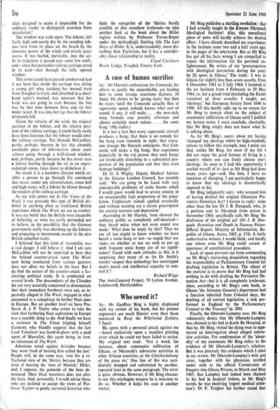Seamy stories
Sir: Of course it was not a salmon that was blown through the window of the railway car- riage at Youghal station. I cannot imagine how Donald McLachlan in his otherwise thoughtful and warm-hearted review of my wife's book The Years of the Week (7 June) could have got such a notion.
It would require a person of 'extraordinary gullibility'-1 quote Donald McLachlan—to imagine that such a thing could happen to a salmon. Surely almost anyone, particularly one expert, as McLachlan is, in naval intelligence, could understand instantly that an event of that kind is an impossibility. It hardly requires a slide-rule to convince any thinking man that if the power of the wind were sufficient to whip the salmon out of the sea (and this in all con- science is improbable enough), that same power would have caused the salmon to disintegrate when it was still within a few feet of the surface.
The creature of whose fate I spoke to McLachlan was a lobster. Nor was it blowri through a 'half-open window.' That would have been unlikely. And I am afraid we have here one more instance of what McLachlan de- scribes—speaking of The Week- -as 'an elegant trick designed to make it impossible for the ordinary reader to distinguish assertion from speculation.'
The window was wide open. The lobster, left fairly high and nearly dry by the receding tide, was torn from its place on the beach by the immense power of the winds and erratic great waves. It was hurled, inevitably, into the air. In its trajectory it passed over some low roofs, and—since that particular railway carriage stood in its path—shot through the fully opened window.
This event could have passed unobserved had it not been that inside the carriage was sitting a young girl who, catching her normal train from Youghal to Cork, and absorbed in a short- hand typist's manual, was unaware that her train was not going to start because the line was by that time between three and six feet under water. It was into her lap that the lobster ultimately fell.
Given the velocity of the wind, the original position of the lobster, and the relative posi- tion of the railway carriage, it could fairly easily have been foreseen that the lobster would enter the railway carriage. Yet Donald McLachlan, partly, perhaps, because he has this absurdly unreliable piece of information about some salmon going through a half-closed window, and, perhaps, partly because he has never seen a lobster hurling through the air in an unpre- cedented storm, takes leave to disbelieve it.
No doubt it is a harmless illusion which en- ables a person to go through life convinced that never, under any circumstances, come hell and high water, will a lobster be blown through the window of his railway carriage.
As my wife points out in The Years of the Week it was precisely this type of British dis- belief in anything alien to traditional British experience which The Week set out to combat. It was my belief that the British were incapable of believing, or were too easily persuaded not to believe, in the possibility that the German government really was churning up the lobsters and preparing to incommode people in the nice British suburban trains.
I believed that this kind of incredulity was a real danger. I still believe it. And I am sure McLachlan will not be surprised to hear that the belated counter-attack upon The Week now being conducted from various quarters does not affect my beliefs in the least. But I do find the nature of the counter-attack a fas- cinating political study. It is conducted on several levels. The descendants of the Cliveden Set are very naturally concerned to demonstrate that their immediate forebears were not, as re- peatedly alleged in The Week, engaged in what amounted to a conspiracy to further Nazi aims in Europe. But on another level we have Pro- fessor A. J. P. Taylor who seems to take the view that furthering Nazi aspirations in Europe was a sensible thing to do. And finally we have a reviewer in The Times (signing himself Gannon), who blandly suggests that the late Lord Vansittart was hand-in-glove with a paid agent of Mussolini, this agent being, in turn, an informant of The Week.
Athenians voted against Aristides because they were 'tired of hearing him called the just.' People will, in the same way, vote for a re- Taylored view of the 'thirties because they are tired of hearing the 'men of Munich,' Hitler, and, I suppose, the genocide of the Jews de- nounced. Their blase weariness does not alter the facts. And, personally, I would advise those who are inclined to accept the views of Pro- fessor Taylor—a gently nurtured historian who finds the savageries of the 'thirties barely credible or else somehow irrelevant—to take another look at the book about the Hitler regime written by Professor Trevor-Roper under the misleadingly limiting title The Last Days of Hitler. It is, understandably, more dis- turbing than Taylorism, but it has a consider- ably closer relationship to reality.







































 Previous page
Previous page